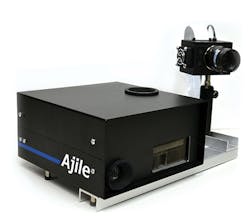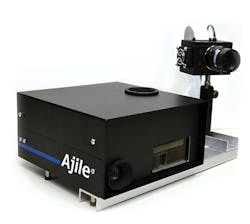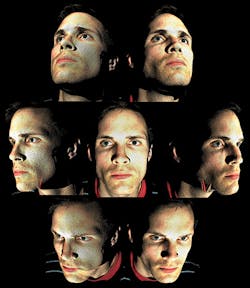3D imaging: Color 3D imaging system uses micro-mirror projector
Surface reconstruction has wide applicability in numerous machine vision applications such as industrial inspection, reverse engineering, object recognition and 3D map building. To date, numerous systems have been developed that use disparate technologies such as stereo cameras, structured laser based systems and pattern projection techniques.
One of the most common of the latter is based on projecting a series of images with different frequencies onto an object. Reflected images are then captured by a camera. Since the pattern is coded, the correspondences between the projected pattern and the captured image pattern can be found, from which a 3D image can be created.
To implement this pattern projection, a number of companies use Digital Mirror Devices (DMD) devices and controllers from Texas Instruments (TI; Dallas, TX, USA; www.ti.com). "While useful," says Dr. Alan Boate, President and CEO of Ajile (Ottawa, ON, Canada; www.ajile.ca), "most of the controllers that TI offers for these devices were really developed for video projection applications and they are somewhat limited in the manner in which they can be used to control LED lighting, provide frame by frame control of the DMD and allow arbitrary frame times to be captured."
Since these features are especially important when developing 3D vision systems, Ajile developed its own controllers for the camera, lighting and TI's 1k x 1k DMD micro-mirror projector .
To illuminate the object to be captured, the company has also developed its own LED lighting controller that allows three channels of R, G and B LEDs to create white coded light patterns. Because of the need to tightly couple the pattern projector with a camera, Ajile also developed its own camera based around the CMV4000 2k x 2k CMOS imager from CMOSIS (Antwerp, Belgium; www.cmosis.com). Running at 180 fps, the camera is used to capture approximately 50 images of different patterns of a scene within 250ms as it is illuminated by the projector.
"Using all three channels of R, G and B LEDs simultaneously results in bright white light illumination reducing the effects of ambient lighting while at the same time resulting in shorter exposure times," says Boate.
To increase the resolution of captured images, patterns of different frequencies are first projected vertically and then horizontally across the illuminated scene. To render color images, three sequential images are then captured using red, green and then blue illumination so that a registered color image can be created.
"Because of the high-resolution of the captured data, the 3D image is more accurate than systems that use a static projector," says Boate.
Images are then processed on the system controller board to create a depth map of the scene. Finally, a color point cloud is generated from this depth map that can be rotated and scaled to better visualize the 3D data.
At this year's Vision Show held in Boston, MA, USA, Ajile demonstrated the results that can be achieved with the system by showing a digitized image of the face of the company's Chief Technical Officer, Jeremy Gribben. On the company's booth this 3D color point cloud was shown being rotated and scaled using the Ajile's software development kit (SDK). A video of the system in operation can be found at: http://ajile.ca/support/videos. In future, the company plans to offer the sub-system to OEMs developing 3D scanners.


